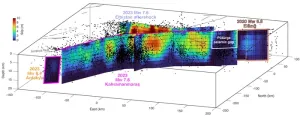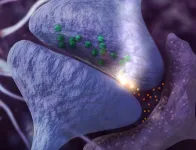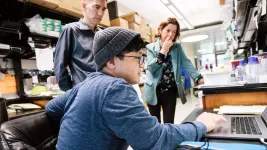(Press-News.org) Economic growth alone may not be enough to deliver the internationally agreed target to end human deaths from dog mediated rabies, according to new research from the University of Surrey. The study identifies that targeting vulnerable populations and improving responsible pet ownership are urgently needed to eradicate the deadly disease, which has strong associations with poverty.
In a landmark study, Surrey researchers investigated whether incidences of rabies are an inevitable consequence of poverty or whether other measures of development, such as healthcare access, can play a role in tackling this preventable disease.
Dr Emma Taylor, a Research Fellow in the School of Veterinary Medicine at the University of Surrey who has also recently become a Surrey Future Fellow, said:
“Despite it being an entirely preventable disease, more than 60,000 people worldwide die from rabies every year. The elimination of rabies needs to be a priority, and with that, the right funding identified, and resources distributed correctly, or it will continue to be a threat to global health and devastate the most vulnerable communities. Economic growth is an important step in reducing the risk of rabies, but it cannot be the only one step to be taken.”
Transmitted through the bite of a rabid animal, the rabies virus infects the central nervous system of mammals which ultimately leads to death. Swift treatment with post exposure prophylaxis (PEP) can prevent the disease developing in people, but it can be expensive and is not universally accessible for many.
To learn more, researchers examined data from over 100 different countries, using three measures of development to assess either the economic wealth of a country (total gross domestic product (GDP), and current health expenditure), and the proportion of deprivation experienced at the individual level (Multidimensional Poverty Index).
Researchers found no relationship between death rates caused by rabies and the GDP of a country and no significant association between health expenditure (% GDP) and rabies incidence. Interestingly, no association was found to occur between health expenditure and the probability of receiving PEP indicating that economic growth alone may not be sufficient in ensuring health care access.
However, researchers did find the higher the level of deprivation, depicted by a high MPI ranking within countries, the higher the probability that the patient would not receive PEP and consequentially the higher the death rate would be from rabies. Researchers believe that the link between MPI and rabies deaths may be due to lack of education and awareness of rabies and ability to travel to receive PEP.
Professor Dan Horton, Professor of Veterinary Virology at the University of Surrey, said:
“The elimination of dog mediated human rabies in many countries shows that the goals are within our reach. However economic growth alone is not enough to achieve this goal and greater focus should be given to dog vaccinations and educating the most vulnerable about rabies.”
These results help to inform important next steps to meet the global 2030 goal of achieving zero human deaths as a result of dog-mediated rabies. The University of Surrey continues to generate evidence and contributes to the leading global partnership for rabies elimination, the United Against Rabies Forum, a collaboration with WHO, WOAH and the UN-FAO which is directly informing international and national rabies control.
This study has been published in PloS Neglected Tropical Diseases.
###
Notes to editors
Dr Emma Taylor and Professor Dan Horton are available for interview upon request.
For more information, please contact the University of Surrey’s press office via mediarelations@surrey.ac.uk
END
Economic growth alone is not enough to eliminate rabies
2023-04-20
ELSE PRESS RELEASES FROM THIS DATE:
PLOS Genetics to launch Microbial Section
2023-04-20
SAN FRANCISCO — PLOS today announced that PLOS Genetics is expanding the scope of its journal with a renamed section called Microbial Genetics. This section will replace the former Prokaryotic Genetics section to emphasize research on microbes more broadly with the aim to publish studies that use genetic approaches to provide insights into how bacteria as well as archaea and their phages/viruses, fungi (including yeasts and filamentous fungi), and protists function and interact with the biotic and abiotic world.
PLOS Genetics has an established presence in the fungal genetics community, but this ...
Moffitt researchers discover pathway critical for lymphoma development
2023-04-20
TAMPA, Fla. — MYC proteins are important regulators of cancer cell growth, proliferation and metabolism through their ability to increase the expression of proteins involved in these processes. Deregulation of MYC proteins occurs in more than half of all cancers and is associated with poor patient prognosis and outcomes. Numerous researchers have devoted significant efforts to try to target MYC proteins as a therapeutic approach to treat cancer. However, this has been extremely challenging to date, and other complementary strategies are being investigated.
In a new article in Blood Cancer Discovery, which was published simultaneously with a presentation ...
Water arsenic including in public water is linked to higher urinary arsenic totals among the U.S. population
2023-04-20
April 20, 2023-- A new study by researchers at Columbia University Mailman School of Public Health shows that water arsenic levels are linked to higher urinary arsenic among the U.S. population for users of both private wells and public water systems. The findings are published in the journal Environmental Research.
Long-term exposure to arsenic even at low and moderate levels can increase the risk of cancer and other types of chronic disease. While drinking water along with diet is a major source ...
UHN Researchers publish ground breaking clinical trial in lung transplantation
2023-04-20
(Toronto, April 20, 2023) Storing donor lungs for transplant at 10 degrees Celsius markedly increases the length of time the organ can live outside the body according to research led by a team of scientists at the Toronto Lung Transplant Program in the Ajmera Transplant Centre at the University Health Network (UHN).
The prospective multicenter, nonrandomized clinical trial study of 70 patients demonstrated that donor lungs remained healthy and viable for transplant up to four times longer compared ...
Turkey’s next quake: USC research shows where, how bad — but not ‘when’
2023-04-20
Researchers know a lot about Turkey’s next major earthquake. They can pinpoint the probable epicenter, estimate its strength and see the spatial footprint of where damage is most likely to occur.
They just can’t say when it will happen.
That’s the main takeaway from a new USC-led study that appears today (April 20) in Seismica.
Using remote sensing, USC geophysicist Sylvain Barbot and his fellow researchers documented the massive Feb. 6 quake that killed more than 50,000 people in Eastern Turkey and toppled more than 100,000 buildings.
Alarmingly, researchers found that a section of the fault remains unbroken and locked – a sign that the plates there ...
Astrocyte dysfunction causes cognitive decline
2023-04-20
People with dementia have protein build-up in astrocytes that may trigger abnormal antiviral activity and memory loss, according to a preclinical study by a team of Weill Cornell Medicine investigators.
Dysfunction in cells called neurons, which transmit messages throughout the brain, has long been the prime suspect in dementia-related cognitive deficits. But a new study, published in Science Advances on April 19, suggests that abnormal immune activity in non-neuronal brain cells called astrocytes is sufficient to cause cognitive deficits in dementia. The discovery could lead to new treatments that reduce excess immune activity in astrocytes and their detrimental effects on other brain ...
UC Irvine biologists discover bees to be brew masters of the insect world
2023-04-20
Irvine, Calif., April 20, 2023 — Scientists at the University of California, Irvine have made a remarkable discovery about cellophane bees – their microbiomes are some of the most fermentative known from the insect world. These bees, which are named for their use of cellophane-like materials to line their subterranean nests, are known for their fascinating behaviors and their important ecological roles as pollinators. Now, researchers have uncovered another aspect of their biology that makes them even more intriguing.
According to a study published in Frontiers in Microbiology, cellophane ...
Sugar rush: scientists discover key role of glucose in brain activity
2023-04-20
SAN FRANCISCO, CA—April 18, 2023—The human brain has a sweet tooth, burning through nearly one quarter of the body’s sugar energy, or glucose, each day. Now, researchers at Gladstone Institutes and UC San Francisco (UCSF) have shed new light on exactly how neurons—the cells that send electrical signals through the brain—consume and metabolize glucose, as well as how these cells adapt to glucose shortages.
Previously, scientists had suspected that much of the glucose used by the brain was metabolized by other brain cells called ...
New study finds shifting climate regions leading to hotter, drier conditions across Kenya
2023-04-20
ST. LOUIS – Research published in Regional Environmental Change has shown that as climate zones shift toward hotter and drier conditions, ecological diversity will decline, posing a major threat to terrestrial ecosystems with far-reaching social and ecological impacts.
The study, “Shifting climate zones and expanding tropical and arid climate regions across Kenya (1980-2020),” was published online on April 5.
The research team analyzed Kenya's geographic distribution and arrangement of ...
Using solar farms to generate fresh desert soil crust
2023-04-20
In the arid regions of the American Southwest, an unseen world lies beneath our feet. Biocrusts, or biological soil crusts, are communities of living organisms. These industrious microbes include cyanobacteria, green algae, fungi, lichens, and mosses, forming a thin layer on the surface of soils in arid and semi-arid ecosystems.
Biocrusts play a crucial role in maintaining soil health and ecosystem sustainability, but they are currently under assault. Human activities including agriculture, urbanization, and off-road ...



